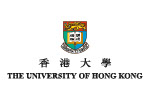HKU’s Policy for Sustainability Lab, which is a pillar of the Centre for Civil Society and Governance, has been recognised by the United Nations as a new member of the International Partnership for the Satoyama Initiative (IPSI), a programme begun in 2010 with the aim of ‘promoting collaboration in the conservation and restoration of sustainable human-influenced natural environments through broader global recognition of their value’.
IPSI, which was established at the Tenth Meeting of the Conference of the Parties to the Convention on Biological Diversity (CBD COP10), now has 240 member organisations from over 60 countries.
Director of the Policy for Sustainability Lab (PSL) Professor Danny Lam Wai-Fung, who is also Professor of Public Administration, said: “The Satoyama Initiative is a model which emphasises harmony between human and environment in a sustainable way. It’s a collective platform to promote our approach to conservation.
“Joining it will put us on the map of the global sustainability movement, enabling us to engage in discussions with bodies around the world doing similar work.”
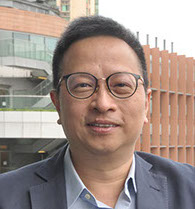
![]() I am a strong believer that actions speak louder than words. HKU is known for its academic excellence, but we want to make sure that excellence is put to good, practical use.
I am a strong believer that actions speak louder than words. HKU is known for its academic excellence, but we want to make sure that excellence is put to good, practical use. ![]()
Professor Danny Lam Wai-Fung
“We’re setting up a co-operative kitchen, with residents from Lai Chi Wo and nearby Sha Tau Kok taking part to work on food processing,” said Professor Lam. “We are also developing co-creation programmes whereby outside groups do activities in villages with villagers.”
One of the co-creation activities was an experiential workshop showing how to make bricks in the style of integral Hakka culture. There is also a Village-to-Table (DIY) Series, jointly presented by the Academy and PMQ’s Taste Library, in which participants make traditional Hakka food under the guidance of villagers or farmers.
For Professor Lam, this is what Lai Chi Wo is all about – sustaining an old community and engaging a new, wider community within the process.
“The Research Assessment Exercise (RAE) effects funding, but the emphasis is always on academic not on action research,” he said. “We think that having an impact is important too. It helps the community see what we are doing and as a social scientist I believe knowledge should be useful and should be shared. IPSI will help us get our message across to a wider audience and will help us reach out to the Hong Kong community too. Lai Chi Wo is for the people, the social fabric of the community.”
Building a community
“You can’t just preserve the environment, you need to build a community,” said Professor Lam. “And we defined community in the broadest sense – not just villagers and farmers but the broader community of Hong Kong.”
They developed socioeconomic models for Lai Chi Wo, including moving away from fresh produce since perishable harvests are not practical because of its remoteness, and into processing products such as turmeric powder.
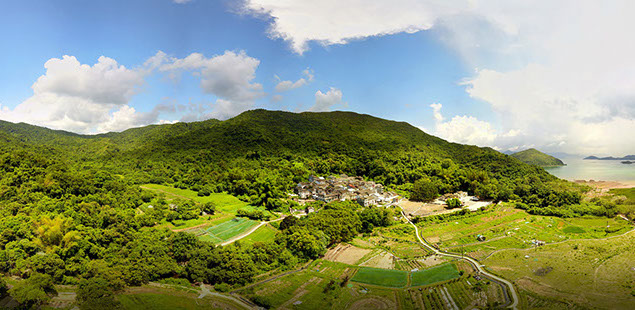
A global voice on
sustainability policy
A place on United Nations body gives University’s Policy for Sustainability Lab a voice in global discussion on the environment.
Back
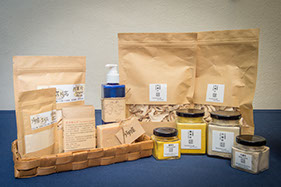
A variety of Lai Chi Wo products were developed for sale locally and at supermarkets and have received overwhelming support from the wider community.
Aerial photo of Lai Chi Wo in 2018 showing the rehabilitated farmland.
Rural rejuvenation
The Lab is being recognised by IPSI for its contribution to rural rejuvenation through its Sustainable Lai Chi Wo initiative, a project to revitalise an abandoned 300-year-old rural village into a working farm and co-operative.
The announcement of the Lab’s accession to IPSI came with a number of other firsts. The PSL is the first IPSI member from the Greater Bay Area, and the event was announced at the launch ceremony for HKU’s Academy for Sustainable Communities, a PSL initiative started in 2018 with “a vision to become a regional knowledge exchange platform to disseminate knowledge of sustainability and incubate a new generation of change agents for sustainability.” The Academy offers curriculum-based courses, seminars, forums and field-based activities covering sustainability-related knowledge.
Professor Lam is keen to emphasise that while one of the themes of PSL is rural revitalisation, the focus is very much on doing as well as thinking. “We are a unit doing academic and action research – that is not only learning but applying what we have learned. I am a strong believer that actions speak louder than words. HKU is known for its academic excellence, but we want to make sure that excellence is put to good, practical use.”
Asked how PSL came to pay attention to rural renewal, he explained that about 40 per cent of Hong Kong’s total land area is protected from development by the Country Parks Ordinance. While this is great for the most part, the down side is that basic infrastructure development in villages, or enclaves, surrounded by country parks is also bound by these rules. The result is that many villages are abandoned.
The Lab cooperated with HSBC, which provided funding, to help revitalise such enclaves, the first of which was Lai Chi Wo, a Hakka village that had been completely abandoned since 1990. The first two phases, from 2013 to 2017, focussed on the basic work, such as reintroducing agriculture, examining biodiversity and researching the river water. In 2018, the third phase kicked in, shifting the emphasis to the social and economic aspects.
Different community groups and individual citizens outside the village engaged in farmland rehabilitation at Lai
Chi Wo.
Art and cultural activities are effective means for community revitalisation.
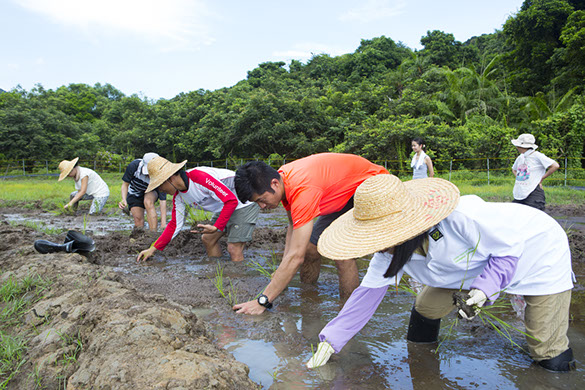

Home
May 2019
Volume 20
No. 2

Knowledge Exchange
